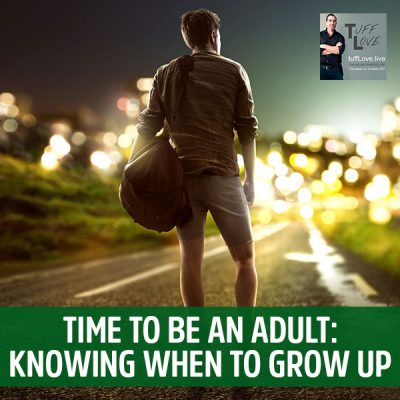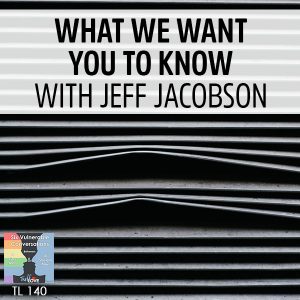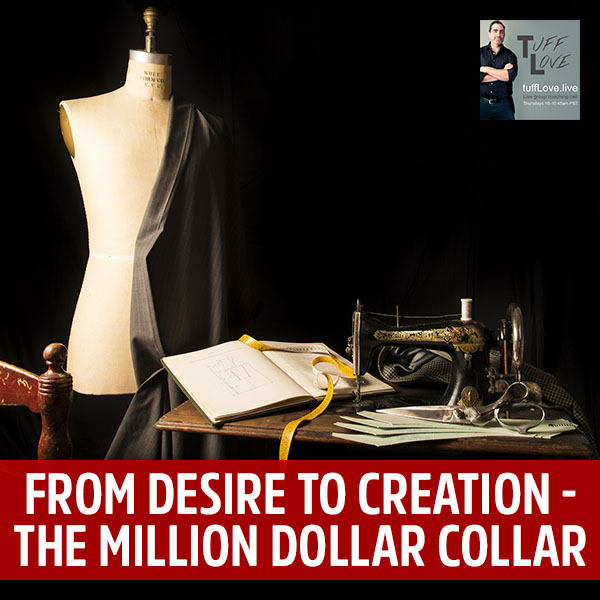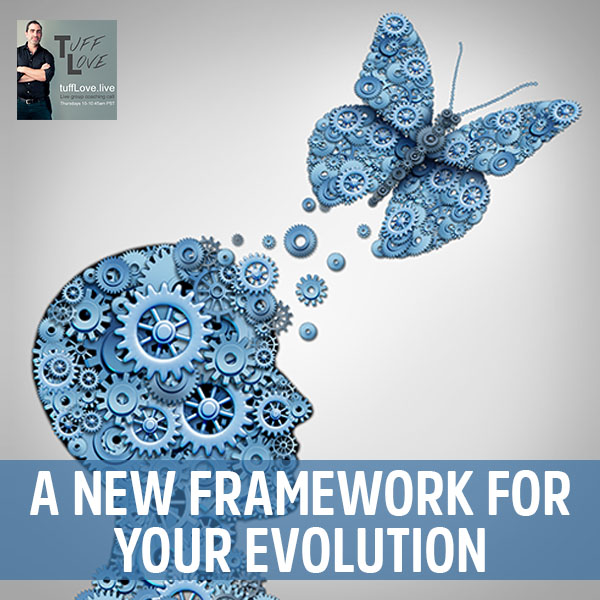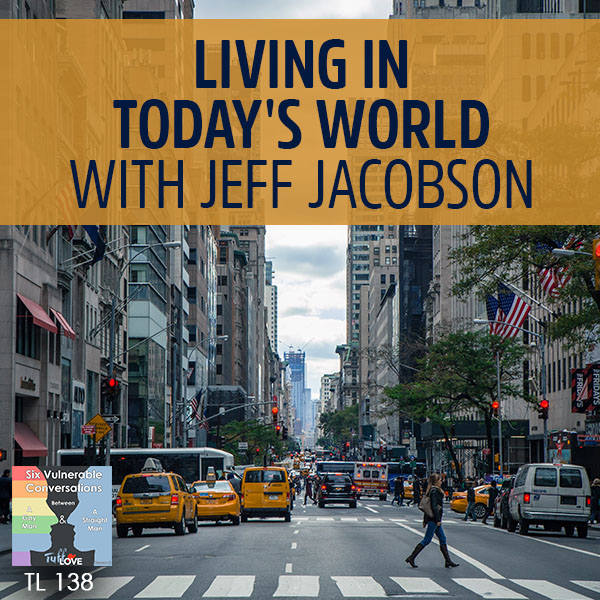
138: Six Conversations 3.5 – Living In Today’s World With Jeff Jacobson
Jun 1, 2018
For gays and straights alike, living in today’s world post-Trump and the #MeToo Movement with Harvey Weinstein has been quite a challenge. A lot of straight guys are scared to death to even engage in dating, flirting and making overt suggestions because of Me Too. On the other hand, some gay guys posted their own experiences online, saying: “Me too, I was harassed, molested, raped as a man.” There is not much of a vehicle for men to talk about this sensitive issue, so for these boys and men to come out with their truth is changing the rulebook. Jeff Jacobson, a gay man, examines the repercussions of these events and more with Rob Kandell, a straight man in Six Vulnerable Conversations. It’s time to set the record straight when it comes to living in today’s society for gays vs. straights.
—
We’re here with show number five of season three of Six Vulnerable Conversations between a gay man played by Jeff and a straight man played by me around the topic of the differences between two men of similar age. Not similar backgrounds, but good guys. One grew up to be a gay man, one grew up to be a straight man and all the items and aspects of our lives are described in the series. This one’s packed. Living In Society is the name of the show and we go from different topics from me to the violence to living hidden to the draft, it goes all over the board. Thank you, Jeff, for participating. If you like the show, please subscribe to my show and this show on iTunes and Stitcher or your favorite podcast app.
138: Six Conversations 3.5 – Living In Today’s World With Jeff Jacobson
This is show five of season three, Six Vulnerable Conversations between a gay man played by Jeff, straight man played by Rob. How are you doing?
I’m good.
What’s been happening in your world?
Speaking of a gay man, I am doing the AIDS/LifeCycle ride and we ride out from San Francisco to Los Angeles. I’m starting to pack. I’ve got biking gear all over my bed here in the second bedroom where I’m getting my bags ready.
AIDS ride, obviously going on for a long time. What prompted you as a gay man? Do you feel especially attached to this ride? What was your motivation?
It’s something that’s interested me for a while. I liked the athletic pursuit of it and theoretically, I like the cause. I certainly want to find a cure for HIV, people living with HIV. It went a little bit more distant from where other donation dollars go. The ride had interested me and every so often, I think about it and I couldn’t do it because of work conflict. I’ll be turning 50. A friend sent out a little donation request raising money and I was like, “I want to do that.” That became a conversation and now I’m doing it. Now I know a bunch more of the money I raised, because I live in Los Angeles, goes to the LA LGBT Center. The work that they do, I didn’t know that they had both emergency housing and then interim housing for LGBTQs, job interview skills and help with job placement. They also have a senior facility for LGBTQI seniors. It’s very touching to learn more about this community and my part in it. I’m definitely more attached to it than I was before I started doing all this fundraising.
This episode is called Living in Today’s World. Let’s talk about AIDS. My history with AIDS was I was born in the ‘70s, I was a teenager in the ‘80s. The AIDS epidemic was pretty much death sentence if you had sex unprotected. It was caused by you people.
Part of what you learned was if you had unprotected sex, you would get AIDS and you would die and my people caused it.
Just say no. All that negativity around sexuality. One experience, a condom fell off and the guy was like, “I’m going to get AIDS, I’m going to get HIV.” It was so entrenched in our fear.
Was there an incident where the guy said that?
Yes, I remember it was college. I started college in 1988. I was a freshman. The guy having sex with a woman, the condom slipped off and he was not so much afraid about pregnancy. He was afraid about HIV. It was so entrenched in the hetero community as deadly.
I don’t think there was that much information about it or maybe that’s my own negativity. People were trying to get the word out and I know there was a lot of misinformation from the government. I went to a Catholic school for nine years. I was in fifth grade in 1980. Somewhere in the early ‘80s, I remember hearing about AIDS. There was this whole thing about whether or not you could get it from drinking the wine from the communion chalice. I don’t remember if it was in one of the subjects of the letters written between the teachers and the parents or something that went up from the principal. It was an official conversation for a while. I started to hear that it was definitely a gay disease and gay sex meant death and gay meant deaths and like, “I don’t want that.” I didn’t come out until the late ‘90s. I did not go through AIDS epidemic with all the losses that many, both queer and straight people that I know, went through who were definitely more involved in gay communities. I met a woman and she and her husband lost their entire community. Over 30 men that was part of their chosen family all died. You were talking about your college time. Did you go through a period there where you knew people that were dying of AIDS?
No, I don’t know if I’ve ever known anyone who’s died of AIDS. I read the book, The Band Played On. It was one of my first nonfiction books I read not preschool. It was so well written, it was so well done. I don’t remember the contents of it but I do remember tracking the disease and trying to paint a picture. I don’t remember if it was you’ll die if you have sex or not in the book.
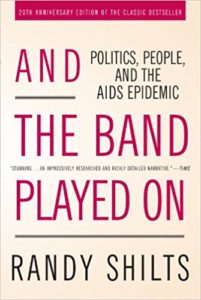
And the Band Played On: Politics, People, and the AIDS Epidemic, 20th-Anniversary Edition
I worked at a hotel after I graduated from college in 1991. From ‘91 to ‘92 I worked at a hotel. Probably two years later, a good friend of mine, she’s the first woman I dated. She started to tell me about a bunch of the people that were dying from the hotel that were gay men that had become HIV positive and contracted AIDS. That’s the closest that I came to it. From reservation, from the restaurant, they died. In a way, I feel like I was outside a lot of that. That was my own little touch into where it was definitely less theoretical.
I had two distinct experiences. One was when Carol and I were having open relationship, unprotected sex with a bisexual man who had a lot of sex. He was a popular bisexual man. I remember being scared out of my mind after the fact, sex with you until I get tested. All this rampant fear that arose in my system because of it. That must’ve been the late ‘90s, early ‘00 to have experience. The first 32 years of my life was nerve racking around sex. A different experience, probably four or five years later, I’m getting tested at the San Francisco city-run clinic in SoMa.
HIV test or the whole panel?
The whole panel, that was my goal. There’s not a lot of cash back then so it was the city-run clinic. I went in and I said, “I had to get HIV tested,” “Great, fill out this form,” and then the form said, “Do you engage in homosexual sex?” No. “Are you an HIV drug user?” No. “How many partners have you had?” Honestly, not that many. They said, “We can’t give you a test because you’re low risk.”
They were limited in their resources.
Yes, 2007, 2008. Just being like, “What are you talking about? I have to get tested. I can have it and I could be dying and I could be passing it around.” Here’s the real statistics. The statistics are heterosexual non-IV drug users with low partner levels is not very high risk. In fact, it’s almost impossible for you to get. It was a huge education. It started my research into the extent of lies around STDs and STIs. The huge lies, the fear of that the Catholic instilled into this, the government and sexual shame and fear into our society.
When they said you were super low risk as a stat, did you feel relieved? Did you believe them? Did it take you awhile to calm down from that?
I believed them because one, the person talking was savvy and he wasn’t like, “We can’t test you because the risk is really low.” He spent another ten or fifteen minutes talking to me and educating me around it. I was part of a strong sexual research community, which means I’ve had lots of different sexual experiences with people. It hit me on how to protect myself and Herpes 1, everyone had it. All these things I was afraid of growing up in the ‘80s and ‘90s wasn’t true or not as bad as they put it out to be.
We’re similar in that vein because of the era in which we grew up. It was definitely, “STDs can kill you. AIDS will kill you.” You have to wear a condom no matter what. Both of us were probably affected by gay sex equals death. Stay away from it. That people maybe after our generation, before our generation definitely got different messages. I remember I went and got tested. I would usually get tested twice a year and it might’ve been down here in Los Angeles and I went to a city-run clinic. There’s the info where they’re taking their stat and asking how many partners, how often do you have sex and what sex.
I am a pop so I don’t get fucked. I don’t have a penis inside my anus. I tend to be lower risk and then at that time, the amount of partners with lower risk. I had multiple partners, I was dating and I’d have sex with different people each month. I remember the woman going through the interview with me, she’s nodding her head as she’s saying, “Have you considered reducing the amount of partners and the amount of sex you’re having?” I felt embarrassed. Later I thought, “That wasn’t so helpful.” This was not a predominantly gay clinic and I probably set off some alarm bells for her anyway because I was a gay man who engaged in sex with more than one person. She was like, “High risk. I better educate this guy.” I forgot that part that it came from us. That part of the stigma.
One of the fears we talked on the first or second show, the fear of dealing with homosexuality was being overtaken, being controlled or being raped by a man and getting the HIV virus, getting AIDS was a huge part of that. It wasn’t just physical and emotional rape. It could be disease and you’ll die. You’ll die a miserable death.
That was happening for people in the ‘80s and early ‘90s, the rape part and dying a miserable death. I could see why that wasn’t completely messed. I’ve done bunch of work with The Body Electric School and that was my queer version of OneTaste. Here’s my understanding. I’m not a founder of the program. My understanding is it was started for gay men to be able to come together and to touch and to share erotic energy and try to de-shame gay sex because of that era of shaming gay sex around AIDS. They taught a non-penetrative approach that had to do more with breathing and showing erotic energy and hand massage. Things that were lower on the risky scale, but we’re still loving and gay celebratory. Folks coming out of that feeling so rooted around their sexuality and trying to heal about it.
The whole school was born around that time. It makes sense. Next one is Me Too. Me Too has been around for ten or twelve years and it was started by an activist. The Founder was woman named Tarana Burke. She started it in 2006. What happened was Harvey Weinstein got busted the fall of 2017 and then all of a sudden, it opened the flood gates. Me Too and Harvey Weinstein happened because Trump was President.
People were set up. This is not okay anymore.
Here’s my real secret. The harboring of the final last toxic masculinity, the last fight of the toxic masculinity was the election of Trump. It was surprising. It was such a communication to feminism. Not that Hillary Clinton was much of a feminist. She was a woman.
She represented that for many people.
She did, she’s a woman. I’m not a huge fan of Hillary Clinton but I was definitely more a fan of Hillary than I was of Trump. The world got fed up with itself that it got elected, that we were on high alert. All of a sudden, as soon as there was an opportunity for this feeling of frustration and anger, I’m like, “What have we done? Harvey Weinstein,” then all of a sudden, the flood gates open. My secret belief system is that Harvey happened because Trump was pissing off so many people.
Harvey had been pulling this crap for a long time. People are like, “Enough.” We hit a saturation point. It’s helpful to hear that Tarana Burke had done that so long ago, but in my mind, Me Too happened around that time. That’s probably when I got involved in it.
What happened in 2006 but there was no publicity because there were no movie stars hanging out with Tarana, and then all of a sudden, Alyssa Milano.
Was she one of the first?
She was the first one apparently to tweet the message. I was online when that happened. All of a sudden, it was huge. Alyssa Milano started it. The woman who busted Harvey was a pretty unknown actress. Then Alyssa hanging out with Tarana changed the world with that one tweet.
I like your theory. I remember assuming once all that stuff came out about Trump grabbing women’s vaginas, there’s no way he can survive this, and then he did. I thought, “You’re kidding me.” I still don’t understand it all but maybe he’s untouchable stage, but other men high up are fine.
Me Too is mostly a heterosexual world. There were obviously some very gay people, Kevin Spacey.
There was a fashion photographer, too.
It has hit the gay community but for my world, now that is a heterosexual male in the Me Too world and not so much because I married and I have sensed it on me. A lot of guys are scared shitless to even engage in dating, flirting and making overt suggestions because of Me Too. I was curious if any of that’s hit the gay community?
I’ll speak for myself like you’re speaking for yourself for het men. No, not at all. There’s a thrill. It’s like our sisters in this prep group are speaking up and saying no to bad behavior. Perhaps there’s some predators amongst us who were freaking out, but I don’t think there’s as much of a concern that flirtatious or even semi-bad behavior would get called on. That’s my sense as much as it’s a yes. Much of the complaint about this is that hetero sex is norm, that heterosexual focus and the patriarchy that keeps that in place, also there’s a lot of shit to the gay community. I speak for myself. I find that thrilling.
The hope is the arising of the Me Too for women will also start to extend in terms of gay men.
Personally, I’m thrilled. I’m hoping more gay men are paying attention because we still have status in the majority of men. Sometimes we pretend we’re the most oppressed person on the planet. It’s like, “No,” and it depends on your affectionality but it would behoove us to pay attention to the crap that women have had to put up with. When you said that, I was thinking, “I wonder if AIDS gay sex equals death was to the gay community like Me Too is to the straight community and straight male community was freaking them out.” Parallels obviously aren’t all going to be, it can be an awkward comparison.
I have hope and I have fear. The hope is that Me Too will wake men the fuck up just to know the impact on women. Waking them up to the impact they have so they can be aware. I’m not calling men bad. I’m calling men something worse, uneducated or unaware. They’ve never been taught that when you do the things you do and women don’t feel safe to tell you the truth, it doesn’t mean you’re doing it right.
It seems like it could be, “Nobody ever said anything wrong,” so it wasn’t wrong.
I’m watching season two of Thirteen Reasons Why. There’s a quote by this guidance counselor that says, “No, boys just need to know. They need to understand consent. They don’t need to be told about consent. They have to know what consent is,” and that’s exactly it. We have to reeducate men to understand consent and women to speak consents. That’s on the hetero side in terms of bringing awareness. People cut that out. That’s my hope is that this will wake guys the fuck up. My theory is Me Too will die down in a year or two and we’ll go back to our status quo. The gravitational pull of the ignorance and the old ways will rise again.
My fear is taking somebody like Harvey Weinstein who’s done many egregious things and we pillory him as the enemy then and we grab these other people. Morgan Freeman, we talked about him. They can be the bad guys and the rest of mankind doesn’t have to look at itself. That would be a fear of mine maybe somewhere with what you’re talking about would die down. We’re going to be, “They’re bad,” and thank God the rest of us don’t do this.
Not all men are like this. It’s hard to even figure out the percentages. In terms of my high school, it felt like 30% of the guys in my high school class will end up as creepers. 70% of our dorkiness will end up just trying to say, “Hi,” to women, no sex.
The thing that hit me and also made me sad and glad that Me Too is speaking up was the amount of stories that women have had to put up with systemic sexism. It’s like, “They made a comment about her breasts at work,” or, “She didn’t get the job because…,” or, “She got the job because…” All this shit that many women have had to put up with that has not been on my radar screen. That also has me look at, “I’m not a predator. I haven’t gone after women that way and have I poopooed what some women have told me?” Have I looked the other way, have I said, “That’s the way the world works.” Seeing my own role in that has slapped me around in a good way. Even though those 30% that you were talking about might be the creepers, I’m glad that we’re all looking at this. I hope it continues as a movement rather than it dies out.
I did a post after Me Too, and it was a hashtag. It was #AlsoMe or #IDidItAlso or #ItWasAlsoMe. It was one of those people admitting, complimenting Me Too, was admitting one’s mistake and I wrote that. Whatever happened in my life, I never cat-called women, I never did these things to women. I thought it was inefficient. I thought it was a dumb play. It’s a cynical waste of time because it would never work, more practical than anything else. I wasn’t one of those guys because I didn’t want to look like an idiot.
It would go against your goals of having sex with a woman.
Right, this is dumb. They worked for some guys but it didn’t work for me. I was never one of those guys. My part was that I didn’t stop other guys’ sexism. I didn’t stop other inappropriate behavior. I never saw a man hurting a woman or physically hurting a woman. I never not stopped that. There have been thousands of experiences, especially in the younger days when I had less self-confidence. Guys sitting around talking shit about women. That was like, “That’s funny.”
I’m guilty of that, too. Hearing conversations at work or with my clients and I had two separate normal corporate jobs before I started coaching. Not knowing what to do and not witnessing anything directly and therefore putting my fingers in my ears, maybe it’ll go away. I didn’t stand up. I’m guilty of that, too.
What I’m hearing from you is Me Too, not a huge impact on the gay community in terms of this fear running through and maybe even a hope to leverage Me Too to raise awareness around how people treat LGBT.
I would say so. I’d say it’s a positive impact. At least that’s my understanding of it. When the water level rises, everybody floats to the top. That’s my hope. I wrote something around the Me Too Movement when some guys that I know we’re posting, “Me too, I was harassed, molested or raped as a man, too.” Something about it didn’t sit right and I didn’t know what it was. I was molested as a boy and for men to be able to come forward and talk about this can be so helpful and healing. There’s not as much of a vehicle for boys and men to talk about this. Something was off about it and I couldn’t sit for a day or two. I was going to post something and I didn’t know what I was thinking.
When I figured it out that when things like that happen to men, not boys, because to me there’s a whole thing around sexual predatory treatment of children we need to pay attention to even better. When it’s young men and men, we treat it as an exception. “I can’t believe that happened to you. That’s disgusting. That’s terrible,” and when it happens to women, we go, “I know. Doesn’t the world suck?” There was a distinction there that wasn’t sitting right in my mind. The sexual mistreatment of women feels way more systemic. That’s what I felt the Me Too Movement was trying to address and I didn’t want a bunch of guys to jump on board and dilute the message. Yet still like, “We got to talk about that happening to men, too.” I want them to be able to heal.
There’s some statistics out there that more men are raped than women.
I’ve heard that and boys, too. That there’s less willingness to come forth and share, report.
A lot of it in the prison system.
I know hardly anything about that. That would be good to have somebody be able to represent that community.
Let’s talk about violence. I’m a white, tall, cis-gendered heterosexual male. I feel like in my 40 years, there have probably been half a dozen situations in my life where I felt endangered bodily and mostly in neighborhoods that were not smart. What’s been your experience with violence as a gay man?
I’m afraid of people like you. I don’t mean you specifically, but your demographic. Butchered up, don’t hold your boyfriend’s hand, don’t act gay, don’t be seen in a gay neighborhood if straight white guys are walking around or straight guys. They will attack. It’s just a matter of they don’t attack me, they’ll attack somebody else that I know or somebody down the street. It definitely feels like dodging bullets. There were definitely threats of violence in middle school and high school. In terms of violence, somebody threw a bottle at me one time. I was holding onto my boyfriend’s hand in San Francisco and somebody threw a bottle at us and it crashed a foot away from my feet. I’ve never been beaten up but I’ve absolutely been afraid of that. It still arises when I’m out with my partner, Terry, and we like to hold hands, have a little PDA. We look around.
Is there certain neighborhoods where you feel safer?
That bottle was thrown at me in the Castro. That killed that bubble because I remember thinking, “At least this is where we can be ourselves.” There’s a lot more expression of that but I felt violated by that. There are definitely places where I’m willing to take more of a risk that I honestly wouldn’t say unless it’s in a retreat setting or a walled-off space. It’s always something in the back of my mind. If I think there are women that are tough and feel confident in their bodies and self-protection will always have that in their mind if they’re walking down the street at night, that idea. It definitely comes up from me when straight guys around or a bunch of straight people around and I may or may not look gay or I’m touching a man.
My entire life, I don’t think I’ve been a second of fear, something about neighborhoods holding my partner’s hands or kissing them, never, I don’t think ever. Club or party, I walk on the streets. If I’m in a bad neighborhood then you do what you’re told, you walk with your soldiers back and your eyes open your hands free.
It’s not so much about you, the heterosexual man kissing somebody.
There’s no kissing. It’s forward motion. In terms of PDA, that’d be the only place I would stop, but that’s not heterosexual. It’s more being a white man, crime statistic. That’s not a usual thing in my life. My entire life I’ve never even hesitated to reach out to my partner, I’ve never scan the street worried. If there are parental units around, you don’t want to sit with your partner with the tongue when you got parental units around. There are certain things but beyond that, it’s not fear.
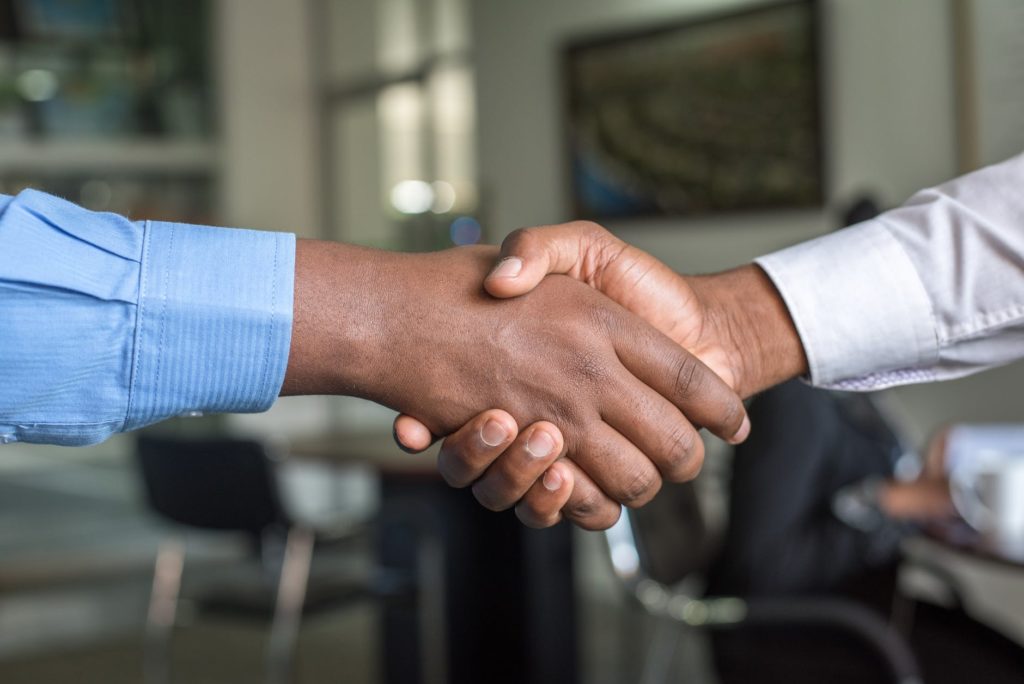
Today’s Society For Gays: First, you check with each other like, ‘Do you feel comfortable with my hands or not? Does the neighborhood feel comfortable?’
Maybe some concern about social impropriety. I don’t know if what I fear is a higher level of that or if it’s a different measure altogether. I cannot imagine what you described. No, that’s not true. I could get it intellectually. I cannot imagine that, not having to do a check. It hadn’t occurred to me. I was talking to a friend of mine, about eight or nine years ago. She’s a straight woman who’s married and I brought this up and she was like, “What?” It’s when the bottle was thrown at us. This is a smart woman, socially aware, absolutely has done her work. She was like, “What are you talking about?” I said, “No, you have to check. First, you check with each other like, ‘Do you feel comfortable with my hands or not? Does the neighborhood feel comfortable?’“ She said, “I realized the only time something in my mind about whether or not I should grab my husband’s hand is if we’re carrying groceries. It wouldn’t be convenient,” it had not occurred to her. I do not get afraid of being beaten up by other women for it. It’s people like you.
The story about the Castro and the bottle, that became a magnet for heterosexual assholes to go, “Let’s go scare some gays.” It became a hunting ground on some level and what thrill was that to throw a bottle at a couple holding hands. How does that help a man feel like a man?
From the work to do of masculinity, it absolutely does because he gets to say, “I’m not that faggot, I am proving my straightness,” which is what it’s all about so many times. Half the time, either that guy or somebody else in the back of the car goes back to the Castro on their own and gets a blow job in an alley somewhere. Not in front of their friends. In a way, it’s a perfect target because it’s highly concentrated.
My book is unHIDDEN and the book is about the ways we hide. This is an epic thing of a whole sexual orientation or sexual orientations who have to live hidden out of fear of being the focus of violence and can’t reach out and hold their partner’s hands.
I don’t know any queer person in a visually obvious same sex relationship who hasn’t thought of that. I’ve incorporated it but it’s something that I’m aware of. People that I know that are darker skinned people of color that have that in the back of their mind about not getting pulled over when they’re driving, it’s like, “Shit. I did not think about that.”
This is the concept of privilege. I’ve done a lot of research, a lot of talking and a few podcasts around privilege. I live and know I’m privileged unless I do the work to see I’m privileged. This is an argument of many social media fights between disempowered genders and disempowered sexual orientations is people in power of position don’t even know what the benefits of their skin color and sexual orientation and place in society. They don’t know, it’s like the same thing. They don’t know the impact, what it means to be white and cis-identified in today’s world.
Folks that are having a bad day or a bad week or a bad month, they’re not necessarily feeling privileged. It’s hard for them to get the absence of certain pains in the ass in the absence of certain obstacle in their life is privileged. When it’s not there, you don’t see it. I don’t worry. Let’s say I have to take on a new client or go into a new organization. I don’t worry that somebody is going to make a sexual comment toward me that could affect me getting a contract. I don’t think about it. In theory it could happen, but I don’t think about it. I’ve got that privilege. It isn’t until somebody starts talking about, I go, “My God.” In this case, I think about the handle all the time and you don’t even have to.
Let’s briefly bring in the story of the pool boys in Mexico. Why don’t you tell the story again for those who didn’t hear the other show? What we’re bringing up is so minor compared to the violence and fear you live in, but it’s a contrary point, let’s bring it up.
It’s something that I care about because contrary to what some people may think, I care deeply for straight men and people like you. I miss you guys and I miss the closest thing we had as kids, growing up with straight guys and all that comes in the way. I’m aware of straight cis men who are doing their best. I appreciate that they need to learn to rein it in at times and question their behavior and look at things.
I was at a retreat in Mexico. There were some employees, we called them pool boys because some of them worked at the pool, some of them worked at the restaurant. They were very attractive men. I was talking about some of these guys with some of the other gay folks that were there as well as some of the women like, “He’s handsome,” and then there was also some attractive women working there and so we were talking about them, both with the gay men and then with the other women there.
There were two guys who were straight, super sweet, grounded guys like you are. I looked over them, I’m like, “I wonder why they’re not joining the conversation?” There was like, “They’re on a razor’s edge.” These guys are grounded enough and have to open the heart to be able to say they find another guy handsome but there doesn’t feel super comfortable to say that. If they say the thing about the woman, they’re going to look like a sexist. In that moment I felt sad. I get why it’s that way. I noticed I wanted more slack for those two men.
There’s so much flagrant views of sexuality by women in today’s world to gain attention. It’s such an interesting balance of like, “She’s really attractive,” without sounding creepy. Creepy is the last thing you ever want to be called. Creepy old guy, I’m 40 years old, but I got a good Roman eye and I have a good eye for women. I like women but I don’t tell people nothing about what I see attractive.
You’ll come across as that creepy pervert.
Maybe Morgan and I have agreements where we can chat about this stuff and she likes to know. She’s curious about what I find it attractive because it doesn’t make a lot of sense because it’s so different. I get this email every day, this thing called Elevator, which I don’t even know how I got on the list. There’s an attractive woman on Instagram in a bathing suit every day. I just click on it to see her Instagram feed. A set of very attractive pictures that’s sexual and there’s no two ways about it. She’s using her body to sell her. She’s a model, most of them are models. The point is that to be a man in today’s world, especially with the Me Too, you have to live hidden with your desire, except in specific acceptable circumstances to be a straight man. If you were talking to another gay man, you could always express you who you thought was attractive?
With women, too. Wherever women I identify in the sexual spectrum or the gender spectrum, yes. We were talking about privilege earlier. The idea of somebody who’s in the majority in that position of power has privilege. There’s also this concept of rank, which I like. People oftentimes in the minority or in their press could have certain rank that those that are above them don’t. I have rank to be able to talk about that without as much repercussion. Gay men should probably rein in there a little bit, it can get a little old and objectifying. It’s giving a number on us as we age because we’re all talking about the young hot ones and it’s like, “What are we saying about ourselves as we age?” That being said, there’s not as much policing of it. A lot of women who feel safe to say it with each other say stuff like that to me too.
It’s about finding another man attractive and there isn’t that charge. Once again, I understand why there is. I want more straight men to question their behavior and be aware of this, but I also want them to have some freedom. The first A has to happen before B can. It hadn’t occurred to me a little bit like you’re not thinking about having to hold hands while walking along. About eight of us walking in this group and talking about these attractive employees. I was like, “All right,” understandably silent.
A bunch of guys sitting around can talk about you. They think they’re hot.
How do they do it? Many times they can be so dehumanizing. Have you found yourself in a group with other straight men where you felt like you were able to have those conversations about finding women attractive in like a pro human, pro woman way?
Yes, that was a lot about OneTaste. We were scared of the women when it came down to it. It was more like that. We could have conversations about who we found attractive and I worked hard to create a society of men who could share their attracted to women and not look at it as competition. That was a big piece but also never in a dehumanizing way that was antithetical to my belief system but also the women could sniff that out and kick our asses if it got out. We learn. The funny part is we have some gender groups. What happened was in the male gender group, we talked about feelings and I heard in the female gender groups they just talked about sex. There’s guys in there before had the opportunity to talk about their feelings until they would watch other guys on the path of self-discovery where they could talk about their fear, desire, anger and all those things. That was unusual.
That’s how we’ve been taught to talk about people we’re attracted to when we’re around other men.
Our roles as men in today’s society. I feel as a heterosexual man, my role is very clear, especially in terms of being a provider, being a good member of society. I always felt like my path and I went on a strange path with my career but never felt questioning of my role.
Even when you left the upper middle-class career path you didn’t feel like you were dropping your role?
No. One, I was the dad of the organization. Two, I was the money man. I was the holder. I was the producer of the woman. Overall, it was much bigger than in terms of being out there and being the leader. I was very much the holder of everything. Dad, partner, money, take out the trash, make sure the trash is taken out sort of thing. My role has been free my entire life and I was wondering you as gay if you had a question in terms of your role in society?
I’m glad you said what you did. I was thinking about this question differently but a little bit more abstract. My role definitely told me that I should like girls, get a job, get married, have kids, be a provider. That’s it. She gets to do the emotional work. She gets to do the artistic work. I do the work outside the home and bring home the bacon. Coming out, it’s like, “I’m letting all that go. I’m not going to be that,” so I’m like a lost boy, the loss of tribe feel. Sometimes I feel it and sometimes I don’t. I’ve heard from other queer people there’s a theory. People that are in the non-gender binary or non hetero world, wherever you are in that LGBTQI spectrum, that our role can be to be on the outside and question the black and white thinking.
There’s almost like a lot of people will quote spiritual traditions in the past where you’ve got someone who’s queer in a native culture. That’s like a shaman or whatever. I can see because we’re not as stuck in that binary but sometimes I might lean on that because it feels like, “What’s my role other than as a wedding planner and somebody that makes people laugh at party?” That’s how gay men are consumed. We’re the entertainers, we’re the decorators and we’re the fun people. That’s definitely more court jester than it is king or queen.
I’m for marriage equality but when marriage equality started to hit, at least I accepted like, “I don’t get to be king or queen, but I’ve got a role as jester.” Marriage equality fucked with that. It’s like, “You could be a provider for another man or you could have kids.” It got confusing again. I’m glad that there are more opportunities, but it’s funny how entrenched I was and how things had to look when things like marriage equality opened up, it’s like, “I’m going to have to let go of some assumptions here,” but I still sometimes, not professionally but socially or on a socio political side of things, I don’t know what my role is. It’s not defined. When I think it’s positive and negative. I don’t know advantages to it, but definitely disadvantages. Any thoughts or reactions after that?
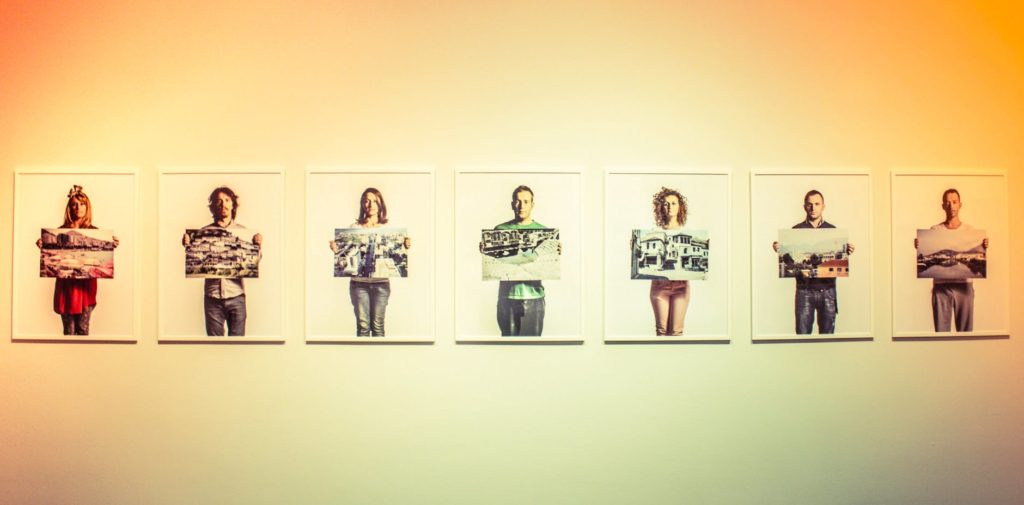
Today’s Society For Gays: I don’t get to be king or queen, but I’ve got a role as jester.
It’s different when we talked about this in different ways, but the road was laid out for me. I had this specific path of who I was supposed to be in all my actions. It was well scripted. I rebelled against that freedom and what often in terms of my career, definitely. There are still parts of me as a man that I feel doesn’t belong to me because of the role. I cherished my life and I cherished who I am, but I feel the animals and the bugs in the house. I’d take out the trash, there are certain roles as a man and Morgan takes care of the kids and takes care of the house. I don’t know if things will be different in different circumstances, but clear that we know what our roles are.
I feel the freedom around that. I don’t feel that. Terry and I do the things around the house or with money because we’re a little bit more interested in it, one or the other. It’s not like I do all the money and he does all the cleaning. I definitely feel the freedom of that. In a way, I don’t feel it’s taken away from me because I’m pigeonholed into a role.
I remember in my mid-twenty, I started attending this men’s group and they were talking about men warping up the masculinity and they were saying, “We are cannon fodder, we’re widget makers, automatons that work and cannon fodder.” I was like, “What?” This has changed with women in the military, but they were talking about traditionally, it’s the men who go to the front line and get shot at to protect the women and children. That affects how we think of ourselves. I was like, “Shit.” It’s not like I thought of myself as a big macho soldier but that rang true. I remember when I was 21, 22, right when the people were getting drafted for the Gulf War. I was like, “Shit, I could get drafted.” I don’t know if you’ve had any of that going through your mind during the Gulf War when it came out. That’s the only time I felt that role because coming out, I left a lot of what you were talking about behind it. It was a clear break.
I wasn’t big fear of the Gulf War. I was in college at the time. There wasn’t a big fear of that. All those thoughts and feelings arose for you around that one thing, about the possibility of being drafted.
I was trying to do the male role then. I was in college too and I was studying in Asia. We were in Malaysia, which has a high Muslim population. Maybe that’s why it was also in my mind like, “We can get sent to the Middle East, to an Arab nation to fight.” It narrowed in or reduced down to that one idea of like, “I’m expendable.” When I passed that possible draft age, because I was thinking they have exemptions for college students, but then they might get rid of that like they did in the Vietnam War. Got a little bit older and coming out as gay, I just felt a lot safer there. I didn’t have as much of that burden.
How do people find you?
JeffJacobsonWorld.com and you can send an email at Jeff@JeffJacobsonWorld.com.
I’m RobertKandell.com. For more shows, please subscribe via iTunes or your favorite podcast app for amazing shows like this with amazing people like the amazing Jeff Jacobson.Thanks so much for tuning in. I appreciate it. Thank you for being vulnerable like us in the world. Good luck. Take care. I love you. Bye.
Thank you so much Jeff Jacobson for showing up and being such an amazing co-host. That was Six Vulnerable Conversations season three, show number five. Living Society, the differences between being gay and being straight. Some are the same and some are very different. I can hold my partner’s hand and he can’t. For more shows, please visit RobertKandell.com. Please subscribe to the show via iTunes, Stitcher, your favorite podcast app. If you feel so inclined, a review, some stars would be lovely. Thank you so much. Good luck. I’ll talk to you next time. Bye.
Resources mentioned:
- Jeff Jacobson
- AIDS/LifeCycle
- LA LGBT Center
- The Band Played On
- The Body Electric School
- OneTaste
- Me Too
- unHIDDEN
- Jeff@JeffJacobsonWorld.com
About Jeff Jacobson
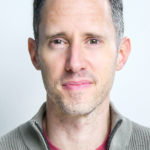 Jeff Jacobson was born in Seattle in 1968, and grew up enchanted by the lush landscape, the long summer days, and the short winter nights of the Pacific Northwest. Once, when he was a wee kindergartner, his grandmother let slip that she was a “modern witch, who flew on a vacuum cleaner over his house at night to protect him.” Jeff had seen her vacuum cleaner. The cord wasn’t long enough to reach his house.
Jeff Jacobson was born in Seattle in 1968, and grew up enchanted by the lush landscape, the long summer days, and the short winter nights of the Pacific Northwest. Once, when he was a wee kindergartner, his grandmother let slip that she was a “modern witch, who flew on a vacuum cleaner over his house at night to protect him.” Jeff had seen her vacuum cleaner. The cord wasn’t long enough to reach his house.
But in bed that night, left alone with creaky sounds and branches scraping over window frames, he decided that having a witch for a grandmother wasn’t such a bad thing. Even if it weren’t true. Two years later, his second-grade teacher Mrs. Eliason read spooky ghost stories and hung cardboard decorations of bats, witches, vampires, and spiders from the ceiling of his classroom for the two months leading up to Halloween. With Seattle’s gloomy, wet afternoons as the setting, the spirit of Halloween took root in his heart, just a few inches over from where his grandmother’s witchy identity resided.
From then on, he did his best to navigate the mundane world of school, chores, and everyday life, while his imagination often ran wild, and he read as many books on witches and All Hallows’ Eve as could get his hands on. In the third grade he spoke Pig Latin and other made-up languages with his friends, creating an early love of sound, linguistic study, and fascination with foreign cultures.
Sports played a big role in his life. He swam on swim teams, ran track, played soccer and tennis, and was a springboard diver for six years. This, combined with the fact that he didn’t play dress-up as a kid, or stage musicals, gave him the false impression that he was just like every other boy around him (foreshadowing alert!).
In college he took Asian Studies classes and dove into learning Mandarin Chinese with gusto, spent his senior year studying in 10 different countries in Asia. He went on to live in Taiwan for two years after graduating from college to pursue advanced Mandarin studies.
In 1994, Jeff moved to California to begin a master’s program in Chinese translation and interpretation, and also joined a men’s group. Three months later he realized two things: that he was much more interested in community-based coaching than he was in being an interpreter, and that it was finally time to come out of the closet. Soon afterward he learned about the wider field of coaching as a profession, and became a certified coach, as well as a faculty member for the Coaches Training
Podcast: Play in new window | Download




